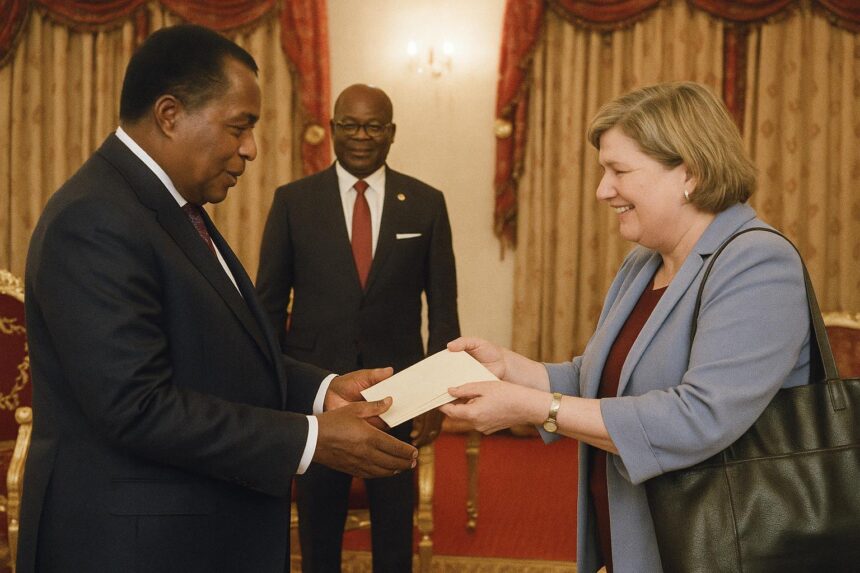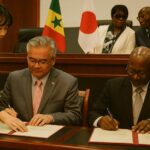Ceremonial Credentials at the Palais du Peuple
Brazzaville’s Palais du Peuple, with its marble columns and understated republican grandeur, provided the backdrop on 28 July for a rite as old as diplomacy itself. In the presence of a tight circle of ministers and senior protocol officers, President Denis Sassou Nguesso received, in rapid succession, the letters of credence of Ambassador Maryse Guilbeault of Canada and Ambassador Hidetoshi Ogawa of Japan. Both envoys reside formally in Kinshasa, yet their early journey up the Congo River underscores Brazzaville’s particular importance in each country’s African calculus. The Head of State welcomed the envoys with remarks that blended courtesy and strategy, emphasising Congo’s vocation as a “factor of balance” in the sub-region (Congolese Ministry of Foreign Affairs).
Canada’s Strategic Overture in Central Africa
For Canada, Ambassador Guilbeault’s posting crowns a career steeped in Latin American and multilateral files. Fluent in French, Spanish and German, the 61-year-old diplomat signalled in her first audience her intention to “translate our shared francophonie into concrete economic deliverables.” Canadian trade with Congo remains modest—estimated at 28 million USD in goods last year (Global Affairs Canada)—yet Ottawa detects openings in agri-business, clean energy services and educational exchanges. Cooperation already rests on the 1974 General Agreement signed in Brazzaville, and Guilbeault hinted at modernising that framework to encompass climate-smart forestry and critical-minerals transparency, two domains where Canadian expertise enjoys credibility.
Japan’s Quiet Diplomacy and Development Footprint
Ambassador Ogawa, 58, a graduate of Tokyo University’s Faculty of Law and former minister-counsellor in Brussels, carries Tokyo’s preference for discreet but durable engagement. In his remarks, he evoked “the symbolism of two river nations seeking unbroken currents of friendship.” Since establishing relations in 1968, Japan has channelled close to 120 million USD in concessional financing and technical cooperation to Congo, with JICA projects ranging from cardiology equipment for the Brazzaville University Hospital to training for fisheries inspectors (JICA data). Commercially, Japanese conglomerates eye opportunities in port modernisation and seismic-resilient infrastructure, tempered by the need for regulatory predictability—a theme the envoy diplomatically broached.
Converging Interests in Brazzaville’s Stability
The near-simultaneous arrival of North American and Asian envoys is more than calendar coincidence. In the current geopolitical climate, Congo’s political continuity, prudent macro-reforms and pivotal seat astride the carbon-rich Congo Basin grant it leverage disproportionate to its size. Analysts in the AU Peace and Security Council note that Brazzaville’s behind-the-scenes mediation in regional disputes has earned quiet respect. Both Ottawa and Tokyo prize that diplomatic capital as they calibrate broader African strategies that balance values advocacy with pragmatic security interests. President Sassou Nguesso’s administration, for its part, views the diversity of partnerships as a hedge against external volatility and a conduit for technology transfer.
Forward Momentum in Triangular Cooperation
Looking ahead, officials in Brazzaville speak of exploring triangular schemes whereby Canadian climate funds and Japanese engineering know-how jointly support Congolese renewable initiatives, particularly small-scale hydro and off-grid solar in forest communities. Such projects would dovetail with Congo’s Nationally Determined Contribution and position the country as a laboratory for low-carbon growth in Central Africa. The new ambassadors, both seasoned multilateralists, hinted at mobilising the Green Climate Fund and the Tokyo International Conference on African Development to that effect. Congolese interlocutors, mindful of absorption capacity, emphasise local workforce training and governance safeguards—areas where Canada’s bilingual vocational programmes and Japan’s kaizen-inspired management workshops could converge productively.
Strategic Outlook Beyond the Credential Ceremony
Diplomatic letters, once handed, quickly cede the stage to the harder work of negotiation, project design and cultural immersion. Yet the symbolism lingers. By welcoming ambassadors from two G7 economies within the same morning, the Congolese presidency signalled continuity in its foreign-policy doctrine: diversify partners, preserve sovereignty, attract investment commensurate with the nation’s ecological endowment. For their part, Ambassadors Guilbeault and Ogawa inherit portfolios rich in potential but demanding in execution. If they succeed, Congo stands to deepen its economic resilience while Canada and Japan secure a reliable anchor in an often-volatile region—a classic diplomatic equation where all variables, for once, appear aligned.




















